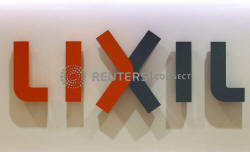Game of thrones: Board battle at toilet maker Lixil a
test for Japan Inc
 Send a link to a friend
Send a link to a friend
 [April 23, 2019]
By Junko Fujita [April 23, 2019]
By Junko Fujita
TOKYO (Reuters) - A simmering boardroom
battle at toilet maker Lixil Group has emerged as a test case for
whether minority shareholders can improve corporate governance in Japan,
the man at the center of the tussle told Reuters.
Kinya Seto, whose abrupt resignation as Lixil's CEO in 2018 prompted a
revolt by minority shareholders, said the company is controlled by an
old guard of management "kingmakers" who prioritize their interests over
shareholders'.
"In Japan even fairly big companies have these kingmakers who are in
power for a decade or two and even the chief executive can't oppose
them," Seto said.
"Their opinions do not necessarily represent shareholders' opinions.
Companies may prioritize kingmakers' opinions and as a result Japanese
companies do not function properly."

The current CEO and chairman of Lixil's board, Yoichiro Ushioda, hails
from one of the company's founding families. His prompt appointment
after Seto's departure had raised concerns about corporate governance
and led to calls for him to resign.
Ushioda bowed to investor pressure and said last week he would step down
in May - but not before publicly putting the blame on Seto for Lixil's
bleak financial performance.
Activist investors have been gaining momentum in Japan and have
complained about what they see as poor performance as well as returns
from cash-hoarding firms, with Prime Minister Shinzo Abe advocating
strengthening corporate governance.
But companies are often able to ignore minority investors given the
longstanding practice of cross-shareholding, where firms hold stakes in
each other to cement business ties.
"If the governance of Japanese companies changes, then corporate
management will improve," said Seto, who remains a director at Lixil and
is seeking to take back the CEO post.
He and another director have said they will propose a new slate of board
members.
"I need to win. If I fail, that becomes a bad example of Japanese
corporate governance," Seto told Reuters this week.
[to top of second column] |

The logo of Lixil Group Corp. is displayed at the company
headquarters in Tokyo September 26, 2013. REUTERS/Issei Kato/File
Photo

KINGMAKER
Lixil was created in 2011 through a merger of five Japanese building materials
and housing firms, including Tostem and Inax. It is well known in Japan for its
high-tech, luxury toilets, while its overseas brands include American Standard
and Grohe.
It has been roiled by the boardroom drama, which has been unusually fractious by
the standards of corporate Japan, since Seto's resignation in October.
According to a report from a group of independent lawyers commissioned by Lixil,
Ushioda last year "engaged in behavior giving the false impression that Mr Seto
had a concrete and clear intention to resign as CEO".
The February report also cites a company director as saying: "No one could
object to Mr. Ushioda, a member of a founding family, saying he will become
CEO".
Ushioda, when announcing his resignation, said he was doing so to take
responsibility for previously appointing Seto.
"The appointment of Seto as CEO was my biggest mistake," Ushioda told a news
conference, saying Seto was responsible for the loss at Lixil's Italian
subsidiary, which forced the company to warn of a full-year net loss.
Seto, in turn, has accused Ushioda of being a "kingmaker" who wields power from
the sidelines of companies and ultimately damages them. Ushioda's willingness to
stay on as adviser points to his desire to hold sway over the company, Seto
added.

A Lixil spokesman, however, pointed out that Ushioda had said he would resign
from the board and management.
"Lixil has been and will try to strengthen corporate governance in order to
boost corporate value sustainably."
(Reporting by Junko Fujita; Editing by David Dolan and Himani Sarkar)
[© 2019 Thomson Reuters. All rights
reserved.] Copyright 2019 Reuters. All rights reserved. This material may not be published,
broadcast, rewritten or redistributed.
Thompson Reuters is solely responsible for this content. |